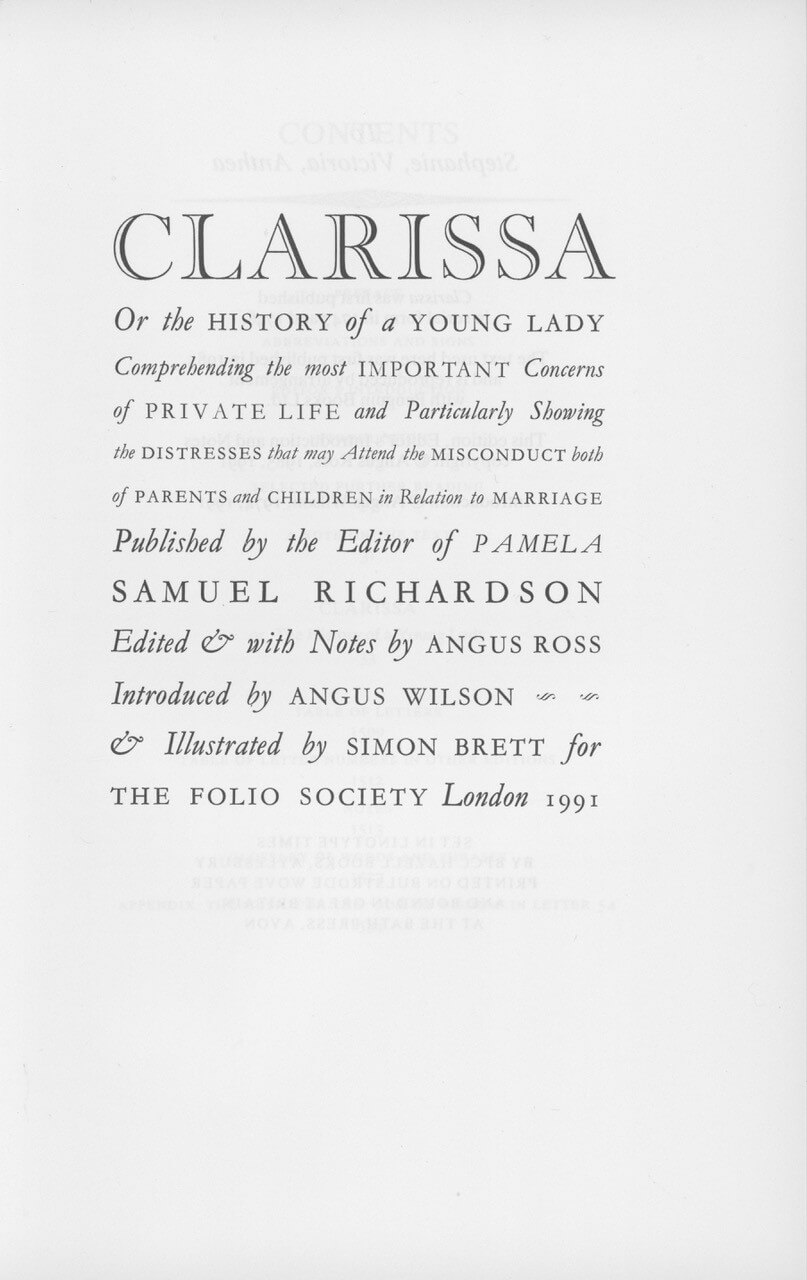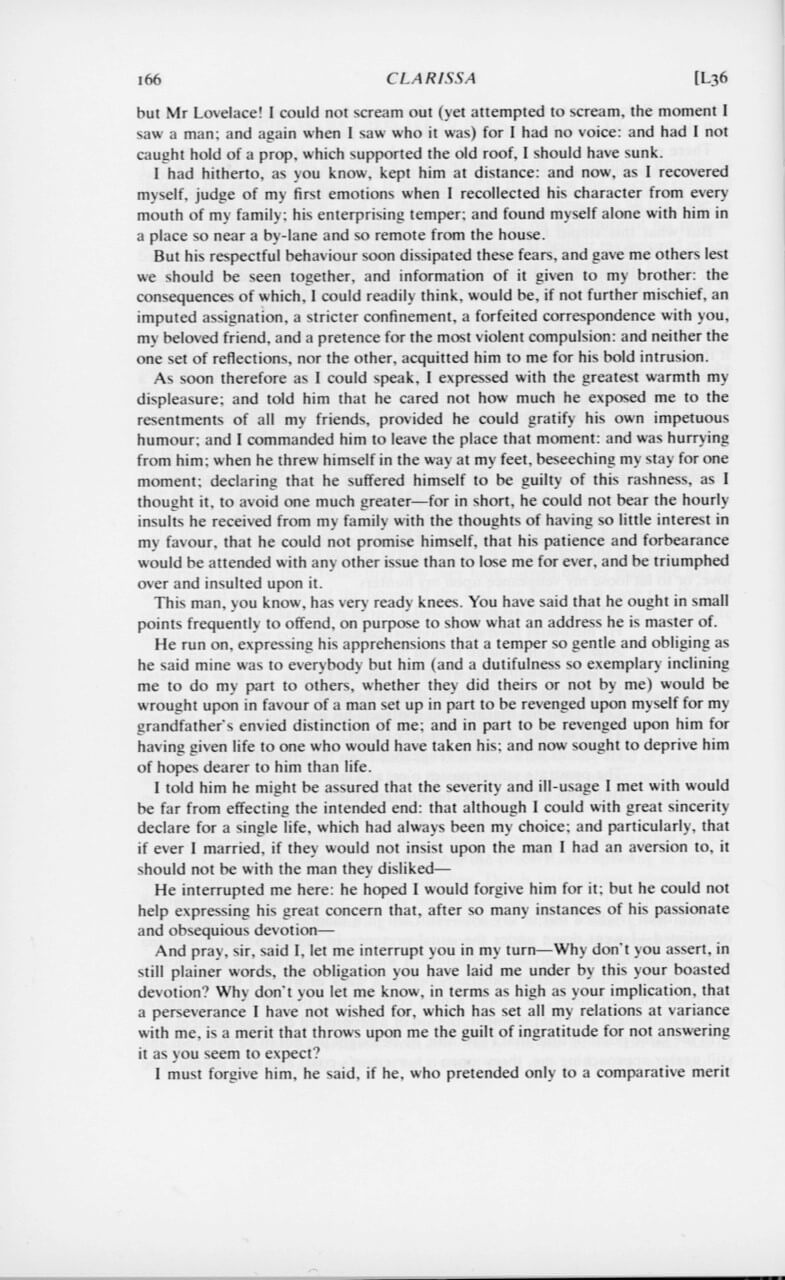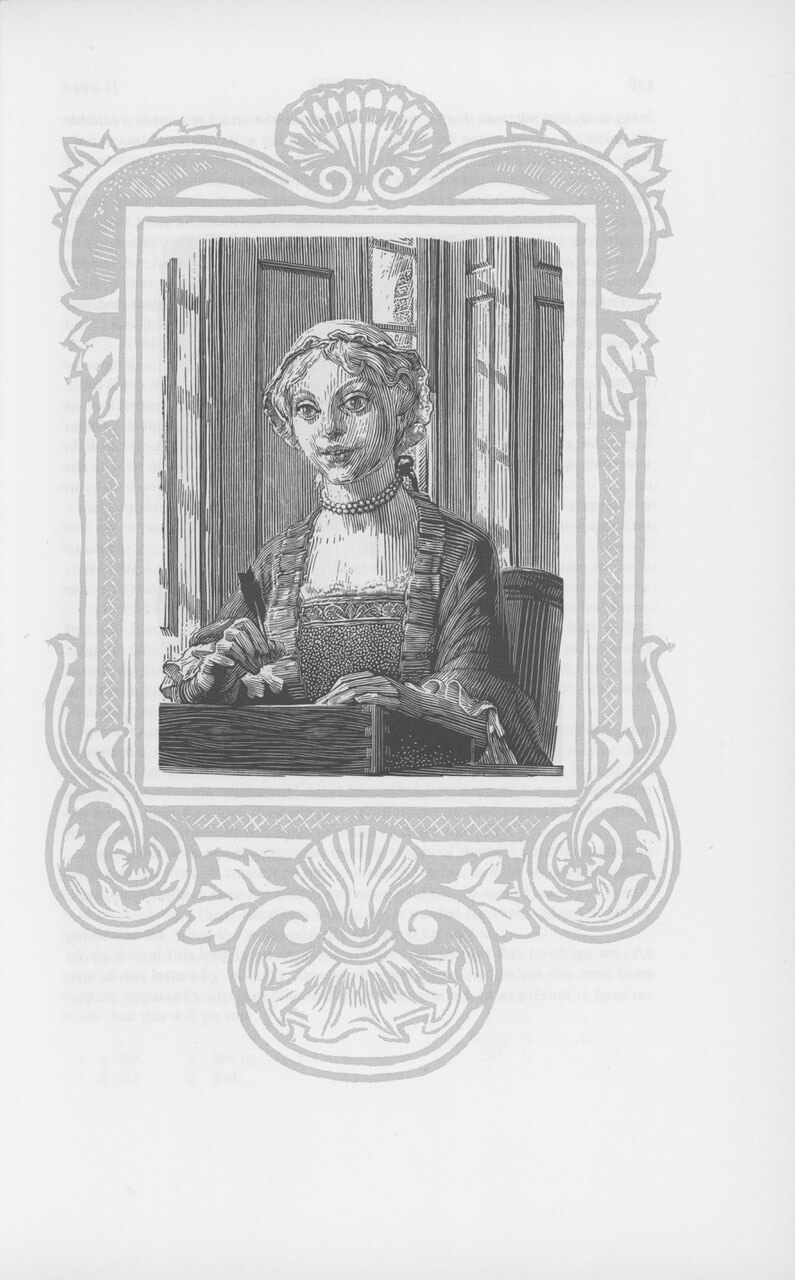I spent much of a dull but dry day finishing my second reading of

prompted by the ‘Richardson’s Novels’ essay in Leslie Stephen’s ‘Hours in a Library’, in which he praises this as the best of the author’s works.
Originally published in serial form during 1747-48, then in eight bound volumes, The Folio Society edition has been packed into two volumes comprising

1,500 tightly compressed pages containing well over a million words, of which this is an example.
If you are able to cast your mind back almost 300 years to a time without television soaps, with no internet, devoid of printers or photocopiers; when reading was done by candlelight and sedan chairs served as taxis; if you are satisfied with the leisurely journey offered by the lengthy prose which entertained those of that era you may well be entranced by this novel.
If you enjoy a fast pace of economical language leading to a quick conclusion; if you prefer watching your serials on streamed television freeing you from deferred gratification before you race ahead to the next, you probably wouldn’t last the course.
Yes, this is a long haul, and perhaps you would need to be an ex-marathon runner forced to slow down to take it on. The first time I read it I was commuting for an hour and a half each way on an intercity train.
Nevertheless this tragic tale presented in the form of exchanges of letters of varying lengths relaying differing perspectives on the same events is in fact compelling reading, if you don’t nod off. It is difficult to write without spoilers – as regular followers will know I try not to reveal the story, but perhaps I can point out that Richardson begins and ends with a duel, an example of his neatly tying up all the strands.
Each of the main protagonists details events and their inner thoughts to a trusted friend with whom they are not necessarily in agreement. Thus morals, honour, deception and devious devices are explored. The language, grammar, and sentence construction is not so different from today, but it is necessary to understand how the writers express themselves. Several copies of the correspondence were sometimes made and passed backwards and forwards to recipients. All this without modern reproductive devices.
A woman, once married, had no rights to property – any she owned became that of her husband, whom she was bound to obey. Although there is now no uniform marriage service in UK it is only 100 years since the female partner was no longer expected to “obey”. Jackie and I can’t quite remember, but we believe that when we first married in 1968, she vowed to obey me; not so in 2017.
It can be seen then, that one motive for marriage was the acquisition of assets and thus the potential enrichment of a family. This is one of Richardson’s themes, as is the domination of the husband.
Angus Wilson’s introduction to this edition is knowledgable and informative.
I am still limited in the number of illustrations I am able to include in posts, so I cannot feature every one of Simon Brett’s drawings.

This one ‘Meeting at Dusk’, appears opposite the sample page 166 above, which conveys the lady’s sensible mistrust.

‘Mr Solmes at Breakfast’ accurately conveys the oppressive atmosphere;

while ‘Miss Howe Writes a Letter’

has, on the reverse, an indication of the deception being employed.
Skilled as these illustrations are, they are rather too evocative of the text for me to include some of the more upsetting ones.
Late this afternoon Becky brought Flo and Ellie home and stayed the night.
We dined on another of Jackie’s shepherd’s pies with similar vegetables as yesterday with which she finished the Sauvignon Blanc, I drank more of the Douro, and the others abstained.

Dull and dry day? I like the these three deeeeees.
Thank you very much, Eunice
You are welcome.
Lovely. About time to hear more about Miss Ellie with pictures.
Thanks very much, Pat
You make a good case for the literary value of Clarissa. However, I’m still making my way through War and Peace.
Thanks very much, Liz. At least War and Peace has a more varied story.
You’re welcome, Derrick. Good to know!
A perfect day to sit and read… I sat knitting 😉 And oh… love Shepherds Pie.. 🙂
Thank you very much, Sue
Your very welcome
These days I am struggling to read a book of poetry, my eyes would definitely be to tired to attempt such a marathon Derrick
Cheers, Ivor
I think you’ve done extremely well to read that twice in one lifetime, Derrick! And I thought two War and Peaces was an achievement!
I’ve only read War and Peace once, John. Thanks very much
Even if I am able to appreciate the extraordinary writing qualities of Balzac, I do find it more suited to an era with little light, long nights or long commutes, such as the ones you had. Having said that, I read the psychological, kind of mind torturing, Crime and punishment in all its psychological detail and thought every word was worth it. I think it is the long background descriptions that I get tired of, sometimes, but that doesn’t take the talent of the authors away.
Thank you very much, Sylvie. If ever I get the time I might reread Dostoevsky
Thank you for sharing your thoughts on Clarissa–and also on the experience of reading it. I think one would need some long stretches of time to read it. That last illustration is creepy!
It is. Thank you very much, Merril
You’re welcome, Derrick.
I do enjoy your catalogues of illustrations for the books you read. Having been a voracious reader in my youth, I seem to have lost the habit in later years so I am very happy for you to do the heavy reading for me while I just look at the pictures.
🙂 Thanks very much, Tootlepedal
I love stories that take me back hundreds of years and paint a picture of times gone by. The domineering husband I can do without. I am quite happy with Dan and our equitable relationship.
Glad to hear both points, AnneMarie. Thanks very much
I’m sure there were good things about living back in those times, but I’m thankful the legal aspects of marriage have changed in most of the world.
Yes. Thanks very much, JoAnna
Reading the page you have posted, reminded me of East Lynne, written by Mrs. Henry Wood. I am intrigued by this page you have here, Derrick. I want to check it if Clarissa is available. I would love to read it. Number of pages doesn’t scare me. I would love to lose myself in the book. Have read several books with thousand and more pages.
There are lots of copies for sale on Google, including the same edition as mine: https://onlineshop.oxfam.org.uk/clarissa-or-the-history-of-a-young-woman-2-volumes-folio-edition/product/HD_300742007?pscid=ps_ggl_OOS+-+Performance+Max+BOOKS+-+2022_&crm_event_code=20REUWWS08&gclid=EAIaIQobChMIu8ngmM-l-wIVSevtCh3Mrg3NEAQYBCABEgJYsPD_BwE&gclsrc=aw.ds
Thanks very much, Zakiah
Ordered it. Thankyou.
I think you will enjoy it
In my experience reading a novel for pleasure can be very different when reading it to study (as I did ‘Clarissa’ in my third year at university) or to teach. Perhaps if I had read ‘Clarissa’ merely for pleasure I would be better disposed towards it 🙂
I would think so, Anne. Thank you very much
The book sounds like an interesting but distressing read. It has not been that long since women were granted some basic rights. A woman’s most basic needs were considered more than optimal. Things still need fixing!
Thank you very much, Lavinia
The drawings are very expressive! I’m glad the women doesn’t need to vow to obey her husband anymore! It is a mutual respect!
Exactly. Thank you very much, Ribana
Hi Derrick, 1500 pages is a long haul. South African women also had to obey and couldn’t have their own bank accounts if married in community of property until about 1990. I knew about it because it effected the mother of my boyfriend at that time and she and her husband went and changed his POA on her bank account when the law changed. Men could also have their wives committed to insane asylums and just take their wealth post marriage. Very sad and scary.
Yes, indeed, Robbie. Thank you very much
I always enjoy hearing about what you are reading! And the illustrations and artwork you share is always so interesting and often so beautiful! 🙂
A day reading…or even just part of a day reading…is a joy and time well spent.
I’m so glad Flo and Ellie are home again. And I hope Dillon is safe and well, too. Hope he can return back to his family soon.
(((HUGS)))
❤️❤️❤️❤️❤️
Dillon is doing well, and will be back in a fortnight. Thanks very much, Carolyn X
Oh, good to hear! 🙂
I found myself playing a proofreading game – how many unnecessary words could be eliminated from the text.
I’m glad Flo and Ellie and back – more photos to coming soon I guess.
Thank you very much, Sue
Right now, I am on a binge of reading mid-twentieth British women writers, and my current obsession is Elizabeth Jane Howard. I am fascinated by her examination of the roles of women—not that long ago and narrow by our standards. Your discussion of Clarissa takes it back even further, where the scope is even narrower still. It seems to me that novels can give the sense of a time just as surely as history can.
Absolutely, Laurie. Thanks very much
The illustrations certainly are very expressive.
Thanks you very much, Dolly
I am currently reading Lorna Doone for the first time and it is very hard work. So much unnecessary verbiage! But I love reading and re-reading Jane Austen, an authour who wrote sparely and very well.
Thanks for sharing your thoughts, Derrick. I agree, that this is not for many of today’s “consumers” of stories. Modern readers often miss out on the experience and satisfaction of reading longer books.
Thanks very much, Barbara
Some years ago I embarked on a course of reading that involved Don Quixote and Moby Dick. The latter would benefit from an editor and the former made me change my view on burning books. There’s a lot to be said for short books that get to the point.
I agree on both those observations, Quercus. Thanks very much.
I wish I had read more good books on my way through life. Recent experience shows that trying to catch up now can be a patchy experience.